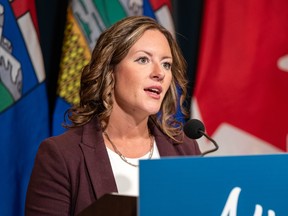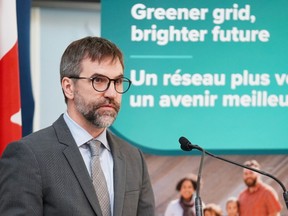
‘Completely out of touch with reality,’ Rebecca Schulz says on dealing with a federal minister hell-bent on shutting down the oil and gas industry

Article content
This is a conversation series by Donna Kennedy-Glans, a writer and former Alberta cabinet minister, featuring newsmakers and intriguing personalities. This week: Alberta Environment Minister Rebecca Schulz.
Sparring between Ottawa and Alberta on matters of energy isn’t news, but a flurry of edicts this summer by Steven Guilbeault, Canada’s minister of the environment and climate change, turned up the heat. How do politicians in Alberta, or any other province for that matter, negotiate with a federal minister who seems hell-bent to shut down the oil and gas industry in Canada and so over-committed to this path, he doesn’t know how to change?
Advertisement 2
Article content
Article content
Rebecca Schulz is the Alberta minister tasked with collaborating with Guilbeault, her federal counterpart. Elected as part of the United Conservative Party (UCP) government in 2019, this 39-year-old Calgarian is three months into her mandate as environment minister.
She inherited a made-in-Alberta Emissions Reduction and Energy Development Plan that aims to achieve a carbon neutral power grid by 2050 (tabled by her predecessor, Sonya Savage, in April). On Aug. 10, Guilbeault put forward clean electricity regulations and a 2035 net-zero timeline — clearly at odds with Alberta’s plan.
And on a different, but adjacent file, there’s been ongoing disagreement between Ottawa and Alberta on the question of who has constitutional authority to regulate emissions and impose caps on oil and gas production.
Last summer, Schulz ran for the leadership of the UCP on a campaign promising less political drama. And now she’s in the thick of things, a core member of a ministerial team created to negotiate key energy issues with Ottawa.
Led by Premier Danielle Smith, this Alberta negotiating team includes the province’s ministers of environment, energy, finance and justice, with other ministers pulled in as needed. They aim to look at outstanding files with the federal government — clean electricity timelines, investment credits for carbon capture and sequestration, methane standards and so on — from all perspectives.
Advertisement 3
Article content
Schulz invites me to join her at McDougall Centre in downtown Calgary for a conversation. This historic Renaissance Revival sandstone building serves as the government’s hub in southern Alberta. As a former MLA in Calgary, I am familiar with the building but the sheriffs at the front door insist on escorting me to the Lone Pine meeting room on the third floor.
I’m caught off guard when the minister inquires about my recent minor surgery, opening up an unanticipated conversation on the merits of early cancer screening. As it happens, the minister in the next office — Health Minister Adriana LaGrange, whom I’ve never met — is then invited to our discussion to receive some of my feedback on cancer care. Our 10-minute chat about cancer concludes, much to my surprise, with a warm hug from the health minister.
Feeling quite at ease, Schulz and I continue this female-to-female exchange, talking about the day-to-day realities of parenting kids and being a politician. Her children are young — 8 and 5 — and I find myself nodding as she explains how she’s learned not to be apologetic about prioritizing family. “I did not miss dropping her (daughter) off on her first day of kindergarten. I did not miss picking her up on her first day. I left here at 2 o’clock. Picked her up at 2:30 and still went and delivered a speech later that night,” Schulz chuckles. She believes this is quite normal for working mothers.
Advertisement 4
Article content
I agree, but most working mothers I know didn’t spend the summer months figuring out how to negotiate with Guilbeault, a former Greenpeace stuntman who demonstrates an enduring embrace of anti-oil and gas ideology. So, how do you negotiate with an activist?
“Minister Guilbeault was my first call” after being named Alberta’s environment minister in early June, she says.
“It was a nice introductory call. It was polite. I offered to meet him, to fly wherever — out east, I knew he had a trip to B.C. and offered to fly to B.C.”
It wasn’t until the third week of July that Schulz met the federal minister, face-to-face, in Calgary.

In their first meeting, the politeness continued, Schulz recalls. She asked for data on the impacts of federal policies for Canadians. And she asked him to set ideology aside: “What I tried to get across was, look, in my opinion, I know we’re coming from different places but we have an opportunity right now. We missed an opportunity with LNG (liquified natural gas) and supplying what the world needs. I want history to show … we were able to put ideology aside and step up with what Alberta and Canada and the world needs right now.”
Advertisement 5
Article content
And then, in early August, with only one day’s notice, Schulz explains how Guilbeault rolled out the clean electricity regulations: “We were told by Ministers Wilkinson (federal Minister of Energy and Natural Resources) and Guilbeault, we (Alberta) would have seven to eight months to provide our feedback. We were then given the basic 75-day minimum.”
Obviously frustrated, she continues, explaining how the Alberta government heard, through the grapevine and while Guilbeault was in China, that the new emissions mandate targets are next, and then the production cap. Meanwhile, Schulz has no response from Guilbeault on his plastics policy. And she’s learning, through indirect sources, the federal government’s planned methane emissions targets are going to be unrealistic.
“Instead of setting targets that are wildly unrealistic or so prescriptive that we’re getting in the way of innovation and creativity, let’s just use common sense,” Schulz declares. The clean electricity plan, for example, requires hundreds of billions of dollars to be spent based on technology that doesn’t even exist. “We’re expected to test it (the new technology), bring it to scale, and they (the feds) haven’t made any investments to allow that to happen,” Schulz says. “And we need to do that all within the next 10 years.” Worse yet, Guilbeault has hinted non-compliance with federal clean electricity laws could be seen as a violation of Canada’s Criminal Code. “I’ve had companies say, if we turn on the power for Albertans the third week of January, who is going to be criminally responsible? It’s so impractical.”
Advertisement 6
Article content
It’s obvious Guilbeault has a green light from Prime Minister Justin Trudeau, but what about others in the Liberal cabinet? There are mixed messages: “Right now, we have the federal ministers on one side saying we want to see natural gas continue, we care about affordability and reliability, we want to see investment decisions made here in hydrogen and petrochemicals,” Schulz reports, “and then we have Minister Guilbeault saying we’re going to end industry at all costs.”
“It’s so completely out of touch with reality. I do believe in technology and emissions reduction but I don’t believe in magic,” the minister says, shaking her head.
Schulz’s tone is faintly reminiscent of how I felt, decades ago, when I too had to negotiate with activists — some, vehemently opposed to any and all oil and gas development.
Is Guilbeault acting alone? “I don’t know enough about federal Liberal politics to say what’s going on behind the scenes,” Schulz says, “but we sit at the table, they say they hear our concerns, we see the draft regulations for clean electricity and there was a cabinet and a prime minister who allowed that to be released. So it cannot be one person. There is a federal government who endorsed that. It’s bigger than one person.”
But, she smiles, “we’re planning for then what.”
Donna Kennedy-Glans is active in the energy business and a multi-generational family farm. Her latest book is Teaching the Dinosaur to Dance: Moving Beyond Business as Usual (2022).
Related Stories
-

The Canadian city that got radical with its crime problem — and it worked
-

Trudeau’s go-to Albertan, Anne McLellan
Our website is the place for the latest breaking news, exclusive scoops, longreads and provocative commentary. Please bookmark nationalpost.com and sign up for our newsletters here.
Article content








Comments
Postmedia is committed to maintaining a lively but civil forum for discussion and encourage all readers to share their views on our articles. Comments may take up to an hour for moderation before appearing on the site. We ask you to keep your comments relevant and respectful. We have enabled email notifications—you will now receive an email if you receive a reply to your comment, there is an update to a comment thread you follow or if a user you follow comments. Visit our Community Guidelines for more information and details on how to adjust your email settings.